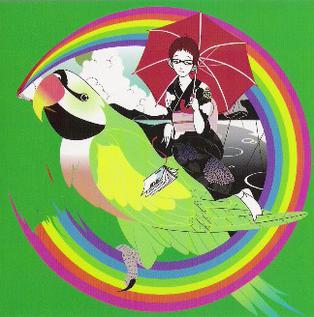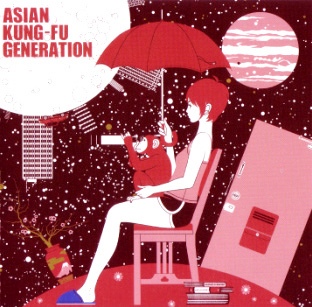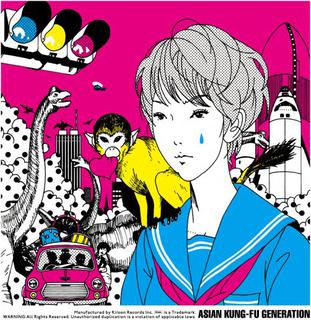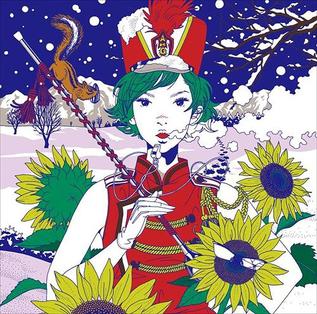
Asian Kung-Fu Generation is a Japanese alternative rock band formed in Yokohama in 1996. For its entire career, the band has consisted of vocalist Masafumi Gotoh, guitarist Kensuke Kita, bassist Takahiro Yamada, and drummer Kiyoshi Ijichi. Starting out as a college band, Asian Kung-Fu Generation released a series of independent EPs featuring lyrics mostly sung in English. In 2002, they released their major-label EP debut Hōkai Amplifier, from that point singing their lyrics in Japanese. The band's musical style is influenced by seminal Western alternative rock acts as well as their own local Japanese indie-rock and punk scene. Their songs incorporate various aspects of the genres, most typically expressing fast tempos and prominent power chord guitar riffs in addition to rhythmic groove and emotional lyrics. Despite the indie nature of their music, the band has enjoyed worldwide commercial success in addition to critical acclaim. Asian Kung-Fu Generation has been cited as one of the best, most balanced modern rock bands to emerge from Japan in the 2000s.

Kimi Tsunagi Five M is the first studio album by Japanese rock band Asian Kung-Fu Generation and their second major-label release overall, released on November 19, 2003 on Kioon Music. The album's name is sometimes given as "Kunkei Five M," but the reading "Kimitsunagi" is given in katakana on the original compact disc. Peaking at number five on the Oricon charts, the LP retained two successful singles, "Mirai no Kakera" and "Kimi to Iu Hana, and has gone on to sell over 250,000 copies. The album is also featured in a live studio recording which is included as a bonus DVD from the limited edition of future compilation, Best Hit AKG.

Sol-fa is the second studio album by Japanese rock band Asian Kung-Fu Generation, released on October 20, 2004.

Mada Minu Ashita ni is the second major-label EP by Japanese rock band Asian Kung-Fu Generation, released on June 11, 2008. The mini-album features songs conceived around the time of the recording of their preceding full-length album, World World World.

"Kimi to Iu Hana" is a song by Japanese rock band Asian Kung-Fu Generation. It was released as the second single of their major-label debut album, Kimi Tsunagi Five M, on October 16, 2003. The song's b-side, "Rocket No.4," was later included on the band's 2006 anniversary compilation, Feedback File. "Kimi to Iu Hana" was ranked at 3rd on fans request for band's 10th anniversary live setlist on September 14, 2013.

"Mirai no Kakera" is a song by Japanese rock band Asian Kung-Fu Generation. It was released as the first single of their major-label debut album, Kimi Tsunagi Five M, on August 6, 2003. In 2020, this song was used for promotional anime video for horse race event, 65th Arima Kinen, with original characters then became anime Fanfare of Adolescence. The song's b-side, "Entrance," was later included on the band's 2006 compilation, Feedback File.

"Siren" is a song by Japanese rock band Asian Kung-Fu Generation. It was released as the lead single of their second full-length studio album, Sol-fa, on April 4, 2004. With the band's then-newly emerging popularity, the single managed to debut at number two on the Oricon charts. Although the song's B-side, "Siren#," shares a nearly identical title with the single, the two are somewhat different from each other. While both retain the same instrumental, the lyrics and melody of "Siren#" are different from that of "Siren." In a sense, "Siren#" can be considered a continuation or a remix of its A-side.

"Loop & Loop" is a song by the Japanese rock band Asian Kung-Fu Generation. It was the second single released from their second full-length studio album, Sol-fa, on May 19, 2004.

"Rewrite" is a song by Japanese rock band Asian Kung-Fu Generation. It was released as the third single of their second full-length studio album, Sol-fa, on August 4, 2004. In 2016, they re-recorded Rewrite along with all songs from Sol-fa and released on November 30, 2016.

Eizō Sakuhinshū Vol. 2: Live at Budokan + is the second video release by Japanese rock band Asian Kung-Fu Generation, released on April 20, 2005 by Ki/oon Records. The two-disc video was also the band's very first live DVD, as the first disc contains live footage of the entirety of the final show of their "Tour Suihai 2004 - No!Member, November-," at Budokan, where they performed before an audience of over 10,000 people on December 5, 2004. The disc retains twenty-two songs, with tracks taken from Kimi Tsunagi Five M, Sol-fa, and Hōkai Amplifier.

"After Dark" is a song by Japanese Indie rock band Asian Kung-Fu Generation. It was released as the second single of their fifth studio album, World World World, on November 7, 2007, nearly a whole year after the release of the album's lead single. The single debuted in the top ten on the Oricon charts and was selected to be used as the seventh opening theme of the anime series Bleach.

"Blue Train" is a song by Japanese rock band Asian Kung-Fu Generation. It was released as the first single of their third studio album, Fanclub, on November 30, 2005. The song entered the top five on the Oricon charts and sold well over 100,000 copies by 2006, becoming the 94th single of the year.

"World Apart" is a song by Japanese rock band Asian Kung-Fu Generation. It was released as the second single of their third studio album, Fanclub, on February 15, 2006. The song is unique for a number of reasons. Not only was it the first single AKG released following their tenth anniversary, it also became their first number-one single, debuting at the top of the Oricon charts. The song's b-side, "Uso to Wonderland," was also the first recording in which Kensuke Kita held the position of lead singer.

"Shinseiki no Love Song" is the 13th single of Japanese rock band Asian Kung-Fu Generation, released on December 2, 2009. There is a limited edition version with a DVD.

"Solanin" is a song by Japanese rock band, Asian Kung-Fu Generation. It was released as a single on March 31, 2010. The song was written for the film of the same name. The music was composed by band member Masafumi Gotoh, while the lyrics was written by Inio Asano, creator of the manga of the same name that the film is based on. Asian Kung-Fu Generation's recording was not used in the film. Instead, a cover, credited to Rotti, a fictional band from the film, with vocals by Aoi Miyazaki, who plays Meiko in the film, was used.

Magic Disk is the sixth studio album by the Japanese rock band Asian Kung-Fu Generation, released on June 23, 2010. It was announced in April 2010 after Gotoh posted an entry into his diary stating the title and that it would be released on June 23, 2010.

"Marching Band" is the 16th single of Japanese rock band Asian Kung-Fu Generation for their first best-of album Best Hit AKG. The single was released on November 30, 2011. The song "N2" is also featured on the album Landmark.

Landmark is the seventh studio album by the Japanese rock band Asian Kung-Fu Generation, released on September 12, 2012.

"Sore dewa, Mata Ashita") is a song by Japanese rock band Asian Kung-Fu Generation. It was released on July 25, 2012 and reached number 11 on the Oricon charts. It was used as the theme song for Road to Ninja: Naruto the Movie and one of the 3 songs by Asian Kung-Fu Generation used in Naruto media, alongside "Haruka Kanata" and "Blood Circulator." The song was ranked 9th on fans request for the band's 10th anniversary live setlist on September 14, 2013.

Best Hit AKG 2 (2012–2018) is the second best-of album by Japanese rock band Asian Kung-Fu Generation. It was released on March 28, 2018, alongside two compilation albums, Best Hit AKG Official Bootleg "HONE" and "IMO". Best Hit AKG 2 contain songs and all singles from 2012–2018 and new song, "Seija no March". HONE and IMO are playlist created by Masafumi Gotoh around when Best Hit AKG released. HONE has a selection of heavier tracks, whilst IMO version is a mix of “power pop” themed songs. Artwork for both albums were drawn by Gotoh and were based The Beatles's red and blue album.




















